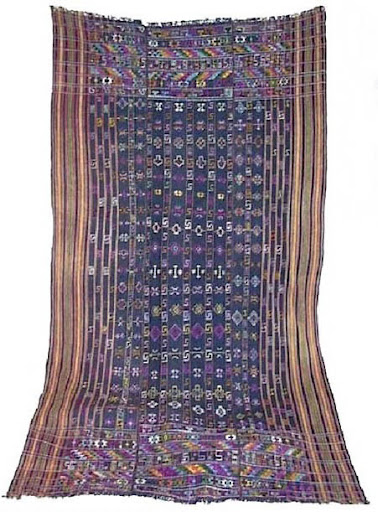
Victor Peñaranda
Visit to Khoma*
I.
fluttering over
fresh cake of cow dung
bright blue butterflies
II.
wild the river runs;
struggling against the rocks
driftwood and flotsam;
beneath swift waters
the resting sands
III.
the women who weave
most luxurious of kira
work all day dissolving
forest and fields, streams and dreams
into fabric meant to be discovered.
they handle silk in silence
laughter at the fingertips,
their movements measured
tempered with kindness.
light flickers in the eyes.
one day, each year, during tsechu
they abandon all labor
to wear their best attire,
leave the village for the festival
and become what they weave.
*Khoma, a community in Lhuntse district, is known for producing the finest and most expensive kira (the costume of Bhutanese women) out of silk. The weavers are women.
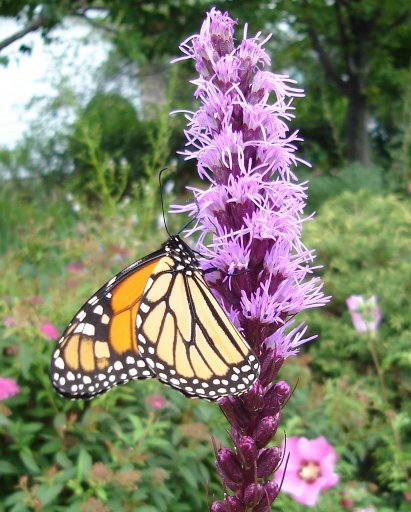
Maurice Oliver
Sex Cement, Drooling, a French Poodle
Then other times,
my life is a bedpost tumble with a crocus
chalice carefully measured in a teaspoon
of tulip’s blush. I lupine over liatris spikes
then drive headfirst into an emphatic
champagne glance of raspberry beret as
Dalai Lama’s broken hull washes up on
shore. I know they say love is supposed to
taste like honey but mine is more like a
gravestone covered in lichen. I wait to
happen as the stoplight curves in my ear
then try using a paper clip. In any case, my
only desire is to simplify, simplify, simplify
in an effort to completely eliminate the open
space between any given number of words.
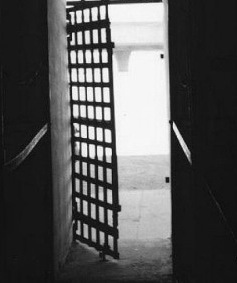
Argee Guevarra
Ang Pananahimik sa Iyong Pagkapiit
(Sa loob ng Camp Crame, N29M)
Ganito ang hikbi ng pananahimik
Kapag bihag ka ng gabi:
Mamimitig ang iyong bisig
ngayong kulob
sa loob ng semento
at kinakarayom ang iyong dibdib
ng dumadapong lamig
na siyang magbabadya ng paglititis
ng mga pagdaraanang pagtitiis
Nanlilisik sa kisame
ang bumbilyang
hindi kumurap-kurap,
waring iniluluwa
ang iskwadron ng lamok
na buong bangis kung lumusob
kasama ang pulutong ng ipis
na magpupulis
sa iyong pamamaluktot
sa loob ng maigsing kumot.
Nanliligalig sa iyong pandinig
ang balagtasan
ng hagok at hilik
at pasyon ng pag-utot
ng mga ka-kosang tuod
na marahas na sususupil
sa iyong pagnanasang makahimbing.
Kay panglaw ng bintanang
dumudungaw sa nakapaskil
na telon ng dilim
upang makapamingwit
maski tilamsik ng ilaw
o buntot ng bulalakaw
na maaaring makatuwang o makaulayaw
Sa pagdagta sa dingding
ng naniig na hamog at hangin,
gigisingin ang iyong damdamin
ng tamis at sabik,
hanghang at galit
ng mga aninong iyong hindi makakapiling
Mapapagulong ka sa sulok
ng pagiisip
at pipitik ang talukap ng iyong pamimikit,
waring gagambang lulundag
ang iyong mga mata
sa pagkapit sa bawat hibla
ng namumukadkad na umaga,
at magsasapot ng malapot na luha
sa bawat siwang
ng rehas na bakal
upang makalambat
ng anumang alabok ng alaala
ng anak, magulang,
kapatid, kaibigan,
pamangkin, apo,
kaibigan, kasama,
asawa o nobya.
Matatag man ang higaan
ng iyong kalooban,
huhulihin ka ng hikab
at tutugisin ka ng antok
sa gabi-gabing pagdalaw
ng ganitong mga pagsubok.
Pupuga ka para managinip sa iyong pagtulog.
Prison Silence
(Inside Camp Crame, N29M)
This is how the silence sobs
When you’re the night’s captive:
Your arms are stiff
cramped
inside walls of concrete
needles prick your chest
and the descending cold
portends the coming tests
the trials still set
At the ceiling
the bulb glares at you
without a blink
as if disgorging
the squadron of mosquitoes
escorting a battalion of vermin
that will police
your cowering
under narrow sheets.
Your ears are distressed
by the jousting verses
of snores and hiccups
the recitative of farts
from co-inmates asleep like dead wood
that will smite any
desire for sleep.
What gloom the window
looks out on—the hung
screen of dark—
to cast into its waters
for the lone sparkle
maybe a comet’s tail
some company of light
As the walls sweat
with curdled dew and air
your senses wake
to sweetness and ache
bitterness, rage, of shadows
of all the loved ones you miss
You’ll turn on your back
to the corner and think
and you’ll flutter your lids behind eyes shuttered,
and your eyes will jump out
like a spider as it
flings and clings to each filament
of the spreading webs of morning,
and weave thick threads of tears
between each bar of iron
to catch whatever
mote or dust of memory
of the son or daughter, parent,
sibling, friend,
niece or nephew, grandchild,
friend, comrade,
wife, lover.
Firm though the berth
of your strength,
you will be cornered by the yawn
and pursued by a drowsing fatigue
in the nightly trials
like this.
You will break this prison
for the fugitive dreams of your sleep.
(translation by Marne L. Kilates)
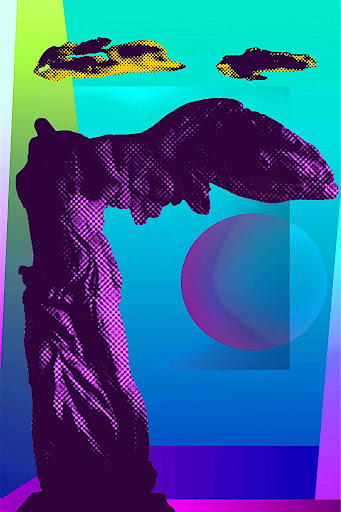
Aberjhani
Angel of Hope’s Persistent Flight
I.
Wreaths of nuclear ash
decorate civilian hearts
with unresolved blood.
Greed, crowned emperor,
rules the earth with cold disdain
for harmony’s path.
War poisons the land
like diseased minds downloaded
into bowls of tears.
Chaos, loving none
so much as itself, slurps and
spits dead souls like bones.
What is belief now?
What is faith that will not die?
What news from heaven?
II.
In midnight’s orchard
roses blossom the secrets
that heal daylight’s wounds.
Beats of broken hearts
flow waves of revelation––
open gates to strength.
Cradled in scorched arms,
a soldier’s moon keeps its vows––
shines persistent hope.
This love that God is
curves in figure eights greater
than both time and space.
Death wins nothing here,
gnawing wings that amputate––
then spread, lift up, fly.
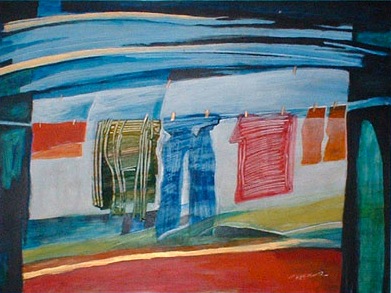
Jose F. Lacaba
Sampayan
Tula para sa painting ni Heber Bartolome, Sinampay
Masdan itong sampayan.
Hindi hari, hindi pari,
ang nagmamay-ari
sa bahaging ito ng mundo.
Dugo, luha, pawis
ay malapot na putik
sa ibang bahagi ng mundo.
Daga, ipis, lamok, limatik:
putik! putik! putik!
sa ibang bahagi ng mundo.
Pero konting sabon, konting tubig,
init ng araw at halik ng hangin
ay papawi ng putik
kahit sa isang saglit.
At sa isang saglit na iyon,
malinis, mabango, makulay ang buhay
sa isang bahagi ng mundo,
dito, sa sampayang ito,
kahit na ang nagmamay-ari
ay hindi pari, hindi hari.
Clothesline
(poem for the Heber Bartolome painting, Sinampay*)
Regard the clothesline.
Neither king nor priest
owns it
in this part of the world.
Blood, tears, sweat
are dirt so thick
in other parts of the world.
Rats, roaches, mosquitoes, leeches:
dirt! dirt! dirt!
in other parts of the world.
But a little soap, a little water,
hot sun and wind’s kiss
will erase the dirt
even in a moment.
And in that moment,
life is clean, fragrant, brightly colored
in one part of the world,
here, on this clothesline,
even if no king or priest
owns it.
(translation by Marne L. Kilates)
Sinampay: laundry, clothes hung out to dry on a clothesline; from sampay, to hang
CREDITS
Old Bargala Church in Macedonia by Saira Peñaranda (detail in Cover Page, full shot on Page 3); Kira cloth from the Bhutan website; Butterfly on liatris by Priyum; view from a cell in the Yuma state prison; Angel de la Guardia by Neil Doloricon; Sinampay by Heber Bartolome
❜
